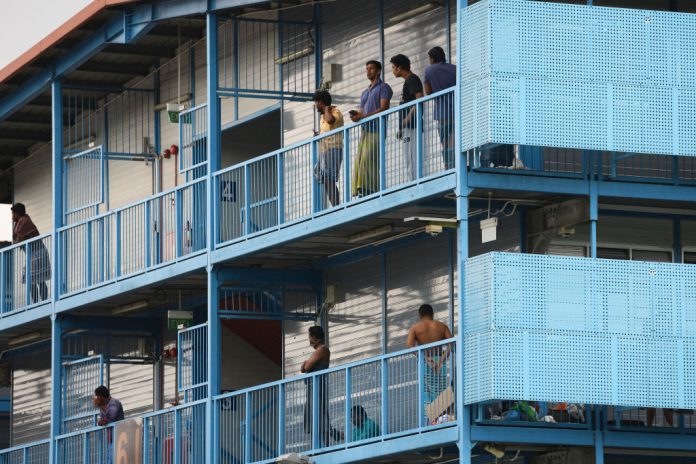About 1,600 dormitories that can house about 440,000 migrant workers will be regulated under a single law from April 1 next year, to help the authorities contain disease outbreaks more quickly and potentially improve living standards within such facilities. The Foreign Employee Dormitories Act (FEDA) will be extended to cover smaller dormitories with seven beds or more. It currently applies only to 53 larger dorms that accommodate 1,000 or more workers – these dorms have 256,000 beds in all. The move could also pave the way for improved living standards to be implemented across existing dorms, both large and small, though the transition to these requirements is still a work in progress.
The Ministry of Manpower, who announced this Tuesday, said dormitories will fall under four licence classes depending on size. All new dorms will have to follow a set of essential living standards – such as minimum space per resident, maximum room occupancy, cleanliness and ventilation – with larger dorms subject to tighter requirements on dormitory management, resident welfare and safety. Existing smaller dorms do not have to upgrade their infrastructure for now, though they will have to meet some new requirements from next April. Commercial dorms with 100 to 299 beds have to submit regular reports on their dorm management practices to MOM. Such Class 2 dorms also need to have fire drills and a contingency plan for public health outbreaks that includes infection control measures. Class 3 dorms with 300 to 999 beds will have to deploy traffic marshals when directed by the authorities.
The Ministry said existing Class 4 dorms with 1,000 beds or more can continue to operate as usual as they are already licensed under Feda. Smaller dorms have to apply for a provisional Feda licence from next January, which will be valid for up to for two years.
Senior Minister of State for Manpower Koh Poh Koon called the move a “significant step forward” in the Government’s efforts to improve workers’ living environments.
He added: “We will work closely with our stakeholders on the progressive implementation of Feda over the next two years to minimise any disruption.” The decision to expand Feda was announced in March last year, nearly a year after Covid-19 had spread like wildfire within the migrant worker community, sparking months of movement restrictions and casting a spotlight on issues such as overcrowding and poor living conditions.
Manpower Minister Tan See Leng, who was Second Minister for Manpower then, had said the experience containing the spread of Covid-19 in worker dorms highlighted the need for MOM to strengthen its regulatory levers. Expanding Feda will allow MOM to raise and enforce housing standards very quickly across various dorm types and sizes, and to introduce new standards to make dormitory living more resilient to public health risks, Dr Tan had said.
More details were supposed to be given in the second half of last year, but this was delayed until Tuesday as the authorities said they needed more time to engage dorm operators on infrastructure constraints and the impact of imposing new licensing requirements.
Currently, all worker dorms, including those not regulated under Feda, are subject to basic standards set by various government agencies, covering areas such as building and fire safety as well as minimum living and hygiene standards.




















